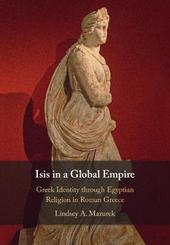
|
Isis in a Global Empire: Greek Identity through Egyptian Religion in Roman Greece
Hardback
Main Details
Description
In Isis in a Global Empire, Lindsey Mazurek explores the growing popularity of Egyptian gods and its impact on Greek identity in the Roman Empire. Bringing together archaeological, art historical, and textual evidence, she demonstrates how the diverse devotees of gods such as Isis and Sarapis considered Greek ethnicity in ways that differed significantly from those of the Greek male elites whose opinions have long shaped our understanding of Roman Greece. These ideas were expressed in various ways - sculptures of Egyptian deities rendered in a Greek style, hymns to Isis that grounded her in Greek geography and mythology, funerary portraits that depicted devotees dressed as Isis, and sanctuaries that used natural and artistic features to evoke stereotypes of the Nile. Mazurek's volume offers a fresh, material history of ancient globalization, one that highlights the role that religion played in the self-identification of provincial Romans and their place in the Mediterranean world.
Author Biography
Lindsey Mazurek is Assistant Professor of Classical Studies at Indiana University, Bloomington and co-editor of Across the Corrupting Sea: Post-Braudelian Approaches to the Ancient Eastern Mediterranean. Her scholarship has been supported by the Loeb Classical Library Foundation, the German Archaeological Institute, the Hardt Foundation, and the National Endowment for the Humanities.
|